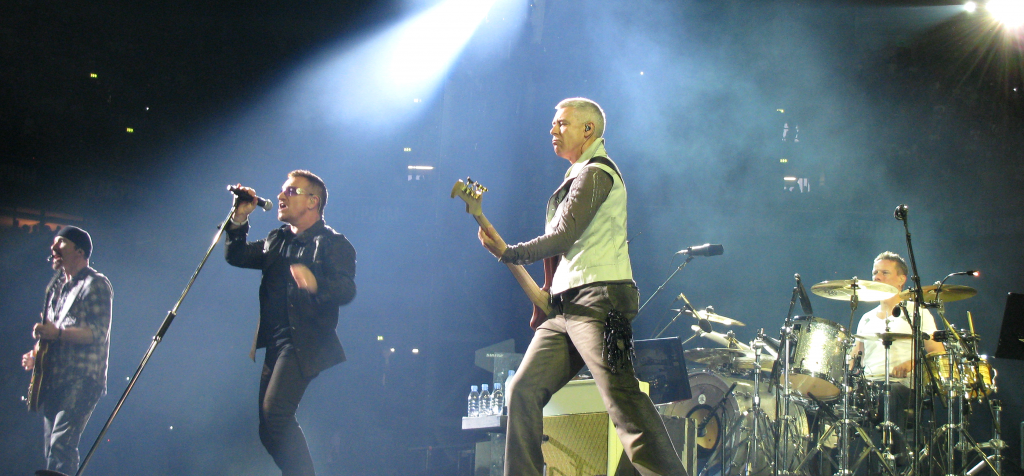Warning: this column contains glowing references to U2 which may be offensive to some readers.
It’s the greatest lyric in rock and roll: “Yeah!” It’s the grand affirmation, the word of exuberant celebration, of heartfelt commitment, of faith and fun, if I can put it that way. Think of The Beatles (“She loves you, yeah yeah yeah”) or Yello’s mid-80s synth-hit, Oh, yeah. It’s the human soul crying with happiness.

U2 performing one of their concerts in their 360° tour in Gelsenkirchen, Germany on August 3 2009. Photo credit: SteBo/ wikimedia
A 2013 study at the Massachusetts Institute of Technology found that the word that brought about the most success in business meetings was “yeah”, because it indicated agreement, warmth and trust between the negotiating parties.
I started thinking about “yeah” because of rock band, U2. I know some people can’t handle Bono’s sunglasses, or seemingly liberal views, but I confess that they minister to my heart in song very frequently. If you can bear with the analysis, I think there are at least three very educational “yeahs” to be found in U2’s lyrics that just might help us with our daily walk in faith (and you don’t need to know the songs to get the benefit).
The first is the “Get Things In Focus Yeah”. This can be found in their song Vertigo, on the 2004 album How to Dismantle an Atomic Bomb (hint: the answer is love). In this song, the singer imagines himself visiting a seedy nightclub, where the meaninglessness and trashiness hits him so hard that he can barely stand. He steadies himself by gazing at a cross hanging around the neck of a dancing girl. “Your love is teaching me how to kneel,” the singer “prays” at the end of the song, before the final line: “Yeah yeah yeah yeah yeah yeah yeah yeah…!” (actually 15 “yeahs”).
This last line grabs me, because it is the “shouting affirmation” of what is truly meaningful in the midst of that hedonistic, capitalistic nightclub: the “yes” that Christ offers to us fallen human beings through his vertigo-stopping sacrifice on that first-century cross. Rather than banal rock lyrics, the 15 yeahs are a faithful confession.
The second is the “Love Rescued Me Yeah”. There’s a lineage from John Newton’s Amazing Grace to U2 singing with the recently deceased B.B. King, When Love Comes to Town. This song begins with a chant of “yeahs” (10 this time), before telling a story laced with biblical imagery of someone “lost at sea” until “love rescued me”. The singer is hopelessly grateful that he “jumped on the train” when “love came to town”. Again, the image of Jesus on the cross completes the song and makes the divine origin of the love very clear. The “yeahs” at the beginning are yeahs of blessed relief that God would save a wretch like me. Yeah!
The third is the “Relax, God is God Yeah”. On U2’s most recent album (the one delivered unrequested into your iTunes library), there’s a song called California. Its subtitle is “There is no end to love” and this is the singer’s theme: in order to cope with the grief and sorrow of the world, we need to know that the love of God is even stronger. Love is stronger than death, as Solomon tells us. In delivering that line in the song, the singer pauses to add an emphasis: “All I know, and all I need to know is there is no, yeah, there is no end to love.” The single “yeah” that occupies that pause could only be sung by someone confident that God will deliver. It’s like the confident “yeah” that builds rapport in business meetings, or links friends together (“yeah, mate, no problem”) and theologically says, “Yeah, life is suffering, but God is bigger than that, and I trust him.” It’s the very relaxed “yeah” of faith. It’s the right response to Christ’s sacrifice, to being forgiven, to seeing hope in the midst of trauma and debauchery, to grabbing hold of the lifebuoy before it floats past. And knowing you have been grabbed. Yeah!
And you thought rock and roll was for the kids.
Greg Clarke is CEO of Bible Society Australia and author of the 2014 Australian Christian Book of the Year, The Great Bible Swindle.
Email This Story
Why not send this to a friend?
